Deutsche Bank stock slumped, and European bank shares dropped to the lowest level since late 2016 after the WSJ reported that Deutsche Bank’s top investor, HNA Group – one of China’s largest conglomerates – intends to completely exit its stake in the German bank as it reverses a debt-fueled acquisition spree under pressure from Beijing.
The extremely levered and cash-strapped Chinese conglomerate, which most recently still held almost 8% of DB’s voting rights, is selling the investment following orders from China that it focuses on its core airline business, as what was once the world’s most aggressive roll-up and acquirer of international companies go into reverse. It’s not clear how HNA would sell the stake, which it controls through a series of complex derivatives, according to Bloomberg.
HNA Group, a company which previously was dubbed as systemically important for China’s economy, and an owner of airlines and hotels that amassed more than $40 billion worth of businesses and stakes in companies in an aggressive global acquisition spree from 2015 to 2017, has been dismantling its overseas empire to shrink its balance sheet under renewed pressure from Chinese regulators and its creditors. HNA’s sale of its DB stake had been previously speculated, but never actually confirmed.

The sale will only add to pressure on Deutsche Bank, whose shares have slumped amid several unsuccessful turnaround efforts, and could act as a catalyst amid speculation that it may need to merge with another lender in the long run. As for HNA, the liquidation will mark the unwinding of one of the most high-profile investments made during a multi-year acquisition spree that cost the company tens of billions of dollars.
DB shares fell as much as 2.1%, bringing its 2018 losses to a staggering 40%.

As recently as 2017, HNA held as much as 9.9% of Europe’s largest bank through a combination of outright holdings and options, but it’s been reducing the investment and replacing actual shares with financial instruments. Most of the stake is now controlled through derivatives that limit HNA’s losses.









Leave A Comment